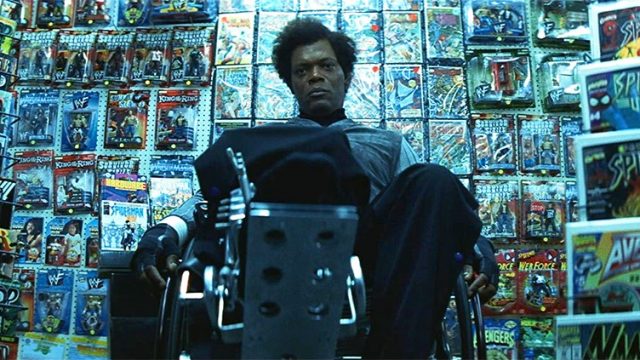It may be hard to believe, but there was a time before superhero movies were mainstream. Although Superman and Batman had made the occasional splash, Hollywood still struggled to tell superhero stories that appealed to a wide audience. Then in July of 2000, X-Men changed the game completely, building on the success of 1998’s Blade and proving that superhero movies could be a critical and commercial success. Four months later, M. Night Shyamalan’s Unbreakable provided a more serious look at superheroes. While X-Men tends to get most of the credit for sparking the explosion of superhero movies, I do find it fascinating that eight years later, the modern age of superhero movies would begin in earnest thanks to two movies: Iron Man, which followed in the footsteps of the fun, genre-savvy X-Men, and The Dark Knight, which took its cues from the somber, grounded Unbreakable. I have a great fondness for this oddity, the rare comic book superhero movie not based on actual comic books…released in a time when marketing would not dare mention the words “comic book” or “superhero.”
Unbreakable may be M. Night Shyamalan’s best-directed movie—or at least his most-directed movie. Barely thirty and coming off an Oscar nomination for The Sixth Sense, he feels like a man with something to prove, every shot crafted with precision, from the numerous shots of characters reflected and/or upside-down to the unbearably tense long takes from unusual camera angles. I would say such visual flair was a joy to behold if it weren’t for the dreary color palette. It’s a shame Shyamalan never worked with cinematographer Eduardo Serra again; they made a great team, but perhaps this visual style that favors strikingly composed frames was best suited to a movie that sought to evoke comic books in every way possible.
I love how seriously this movie takes the idea of superheroes in the real world, and I hate how seriously this movie takes the idea of superheroes in the real world. Especially in the same year as X-Men, in which we learn what happens when a toad is struck by lightning, it’s refreshing to examine what might truly happen if an ordinary man discovered that he had superpowers. But the film’s ludicrous adherence to comic book ideals—explicated for a mainstream audience by Samuel L. Jackson as comic book aficionado Mr. Glass—keeps making cracks in the real-world façade. For every endearingly portentous scene where Bruce Willis asks his son to pile on more weights to see how strong he is, there’s an embarrassingly portentous scene where Glass shares his epiphany that superheroes have weaknesses. Shyamalan never gets the balance quite right (Christopher Nolan would come closer with The Dark Knight), but, God, it feels like he’s so close, and every time I watch this movie, I can’t put my finger on just what’s missing that would elevate this film from Really Good to Great.
There’s plenty to discuss with Unbreakable—the fine performances by Bruce Willis as David Dunn and especially Samuel L. Jackson, the merits and pitfalls of its slow pace, that terrible ending text—but I want to highlight an aspect of the film that often goes overlooked and, in fact, I had completely forgotten about before rewatching: Robin Wright and the subplot about David Dunn’s failing marriage. Compared to the heavy-handed treatment of comic book tropes, Shyamalan writes this story with remarkable subtlety. We never get a specific explanation for why they’re on the rocks; it’s not as simple as that. But Robin Wright brings such a sense of hope and warmth to the intangible ennui between them that she’s like the living embodiment of the half-second before Melora Walters smiles at the end of Magnolia. When you think of Unbreakable, you probably don’t think about a married couple on a date talking about their favorite colors. You probably don’t think about Robin Wright standing in the doorway asking whether her husband has slept with anyone, not that it will change anything, because she’s made a decision, and that decision is to give it another try. But you should, because it’s these utterly human moments that ground this fantastical tale.
Now it’s nineteen years later, and David Dunn and Mr. Glass will finally get to square off—joined by The Horde, introduced in 2016’s Split. These characters find themselves in a wholly new superhero landscape, dominated by the entertaining and self-aware Marvel Cinematic Universe and the generally dour DC Extended Universe (which has been course-correcting by adopting Marvel’s tone instead of figuring out how to make theirs work). Comic IP continues to reign, despite films like the underrated Push in 2009 and the excellent Chronicle in 2012 making their cases for something different. Whatever the critical and commercial response to Glass, I hope the return of these characters and the renewed focus on Unbreakable challenge studios—big and small—to explore more original takes on superhero ideas.


